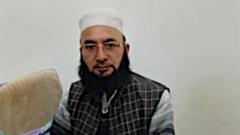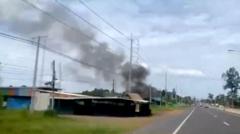Following the death of Mohammad Iqbal in cross-border shelling, his brother Farooq Ahmed faces not only grief but also the pain of false media claims labeling Iqbal a terrorist. This reflects a troubling trend of misinformation during military conflicts.**
Misinformation Amid Mourning: A Kashmiri Family’s Struggle for Truth**

Misinformation Amid Mourning: A Kashmiri Family’s Struggle for Truth**
Misidentifications and media inaccuracies turn a family tragedy into public defamation in Jammu and Kashmir.**
In the aftermath of a devastating loss, Farooq Ahmed is grappling not only with the death of his brother, Mohammad Iqbal, but also with the distressing consequences of media misinformation. Iqbal, a teacher at the Zia-ul-Uloom madrassa in Poonch city, lost his life on May 7 during cross-border shelling between India and Pakistan. This incident followed India's retaliatory airstrikes in response to a militant attack that had claimed 26 lives.
While the family mourned the loss of their sole breadwinner, their grief was compounded when news outlets inaccurately labeled Iqbal as a terrorist based solely on his appearance—the presence of a beard and a skullcap. "It felt like salt was being rubbed into our wounds. My brother had no chance to defend himself," shared Mr. Ahmed. This false claim gained traction despite a subsequent police statement affirming Iqbal's respected status within the community and distancing him from any terrorist affiliations.
The ongoing conflict between the two nuclear-armed nations has long been marked by tension, and the recent escalation has led to a flood of disinformation online. Amidst the chaos, one prominent independent news editor remarked on the unprecedented level of sensationalism displayed by many media outlets, questioning the reliability of the information being broadcasted.
In the wake of the accusations, the family found themselves surrounded by a barrage of inquiries and confusion as the myth of Iqbal’s supposed identity spread uncontrollably across platforms, including WhatsApp. "We learned about the false narrative only after relatives reached out with screenshots from news channels," Mr. Ahmed revealed. The police's swift clarification fell on deaf ears as the misinformation had already been absorbed by a large audience.
Mr. Ahmed wishes to pursue legal action against the channels responsible for the defamation, but the financial burden weighs heavily upon his family as they navigate the challenges posed by Iqbal's absence. With eight children to support, the little compensation received from the government is only a temporary solution to a long-term problem.
"How will people understand our pain when many believe my brother is a terrorist whose death was justified?" Mr. Ahmed poignantly asks. The family is left to cope with both the emotional scars of their loss and the harsh reality of reputational damage caused by careless reporting, a chilling reminder of the intersecting landscapes of media, conflict, and personal tragedy.
While the family mourned the loss of their sole breadwinner, their grief was compounded when news outlets inaccurately labeled Iqbal as a terrorist based solely on his appearance—the presence of a beard and a skullcap. "It felt like salt was being rubbed into our wounds. My brother had no chance to defend himself," shared Mr. Ahmed. This false claim gained traction despite a subsequent police statement affirming Iqbal's respected status within the community and distancing him from any terrorist affiliations.
The ongoing conflict between the two nuclear-armed nations has long been marked by tension, and the recent escalation has led to a flood of disinformation online. Amidst the chaos, one prominent independent news editor remarked on the unprecedented level of sensationalism displayed by many media outlets, questioning the reliability of the information being broadcasted.
In the wake of the accusations, the family found themselves surrounded by a barrage of inquiries and confusion as the myth of Iqbal’s supposed identity spread uncontrollably across platforms, including WhatsApp. "We learned about the false narrative only after relatives reached out with screenshots from news channels," Mr. Ahmed revealed. The police's swift clarification fell on deaf ears as the misinformation had already been absorbed by a large audience.
Mr. Ahmed wishes to pursue legal action against the channels responsible for the defamation, but the financial burden weighs heavily upon his family as they navigate the challenges posed by Iqbal's absence. With eight children to support, the little compensation received from the government is only a temporary solution to a long-term problem.
"How will people understand our pain when many believe my brother is a terrorist whose death was justified?" Mr. Ahmed poignantly asks. The family is left to cope with both the emotional scars of their loss and the harsh reality of reputational damage caused by careless reporting, a chilling reminder of the intersecting landscapes of media, conflict, and personal tragedy.




















